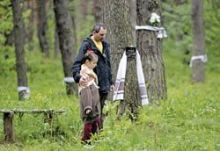On the third Sunday of May independent Ukraine annually pays homage to millions of innocent people whose life was cut short by the Soviet repressive totalitarian machine that destroyed our people with marked cruelty in the 1920s-1950s. This time, on May 16, the Memorial Day was observed in the horrible Bykivnia Forest, the place of last repose of hundreds of thousands of Ukrainians, Poles, Russians, Jews, people of other ethnic groups who were condemned to death by the tyrannical Stalinist government, often in retaliation for their desire to think like free individuals.
Of special interest is a statement on President Viktor Yanukovych’s official website. It is a message addressing the Ukrainian nation in conjunction with the Memorial Day of the Victims of Political Oppressions. The head of state expresses his sympathy with all peoples that suffered from the terror of totalitarian regimes. The document stresses that, in the 1930s-1940s, Ukraine was inflicted heavy losses: “The Stalinist repressive machine destroyed all who attempted to resist it. Anyone — a peasant, intellectual, schoolteacher, engineer, worker or scientist — could fall prey to it… It was a time of disillusionment, despair, and hopelessness. Our memory and prayers must become the best homage to those who died, just as we must take daily care of the people who survived those horrible years… May our joint memories become a guarantee that such tragedies will never happen again.”
This message deserves special notice for several reasons. First, the new Ukrainian administration has never since taking office come up with such a sharp, clear-cut assessment of Stalinist atrocities on the highest political level. This is a truly noticeable event. Regrettably, another reason is that the communists, as partners of the ruling Party of Regions, have adopted a public stand that, mildly speaking, differs somewhat from the president’s message. The newspaper Komunist, the official organ of the CC of the Communist Party of Ukraine, recently referred to Joseph Stain as “the chief organizer of our Great Victory in the Great Patriotic War.” Previously that “leader of the peoples” was described as “an outstanding humanist of world caliber… a prominent strategist of victories of the socialist system in the USSR,” and so on. The logical question is, assuming that the Party of Regions, being the main support of the coalition (considering that the head of state actually represents it), officially recognizes the crimes perpetrated by the Stalinist regime, whereas the Communist Party, being its partner, persists in singing glory to that bloodthirsty tyrant, what does this mean? Is this proof of utter chaos and ideological discord within the ruling coalition? Or that those currently in power believe that the attitude to Stalin is a minor issue, because, allegedly, first you have to feed the people? Is this why the political leadership seemed to refrain from supporting the communist idea of erecting a monument to Lenin in Zaporizhia while not lifting a finger to prevent this project from being implemented?
The said message sounds good, if only it had the merit of being sincere.
The Memorial Day was observed on Sunday in Bykivnia and all over Ukraine. A Mass for the Dead was celebrated in Lviv, attended by about 200 residents. The municipal and regional authorities and public figures placed wreaths at the Monument to the Victims of Communist Crimes. The Day’s correspondent Tetiana KOZYRIEVA notes that those who took the floor during the ceremony also condemned the new government, detecting in its actions signs of returning to totalitarianism and dictatorship, calling for public actions in defense of the liberties being threatened in Ukraine.
People in Zhytomyr also offered up prayers for the innocent victims, although The Day’s Valerii KOSTIUKEVYCH points out the absence of clergy of the Moscow Patriarchate of the Ukrainian Orthodox Church.
Bohdan DYMOVSKY reports from Odesa that a hundred young people lit candles and formed a Chain of Memory by linking hands. The date was marked by the national flags at half-mast on the official buildings in the region. Mass for the Dead was conducted in the houses of God.
Viktoria KOBYLIANSKA reports from Cherkasy about the roundtable “An Act of Genocide against the Ukrainians: Past and Present Realities,” organized by the NGO Kholodnoyarska respublika (The Republic of Kholodny Yar).
Vadym RYZHOV reports from Dnipropetrovsk about a requiem rally held at the ninth kilometer of Zaporizhia Highway, organized by Sicheslavshchyna Ukrainska, an association of political parties and NGOs. According to historians, there were three such sites at Dnipropetrovsk where some 80,000 victims of shootings were buried.







